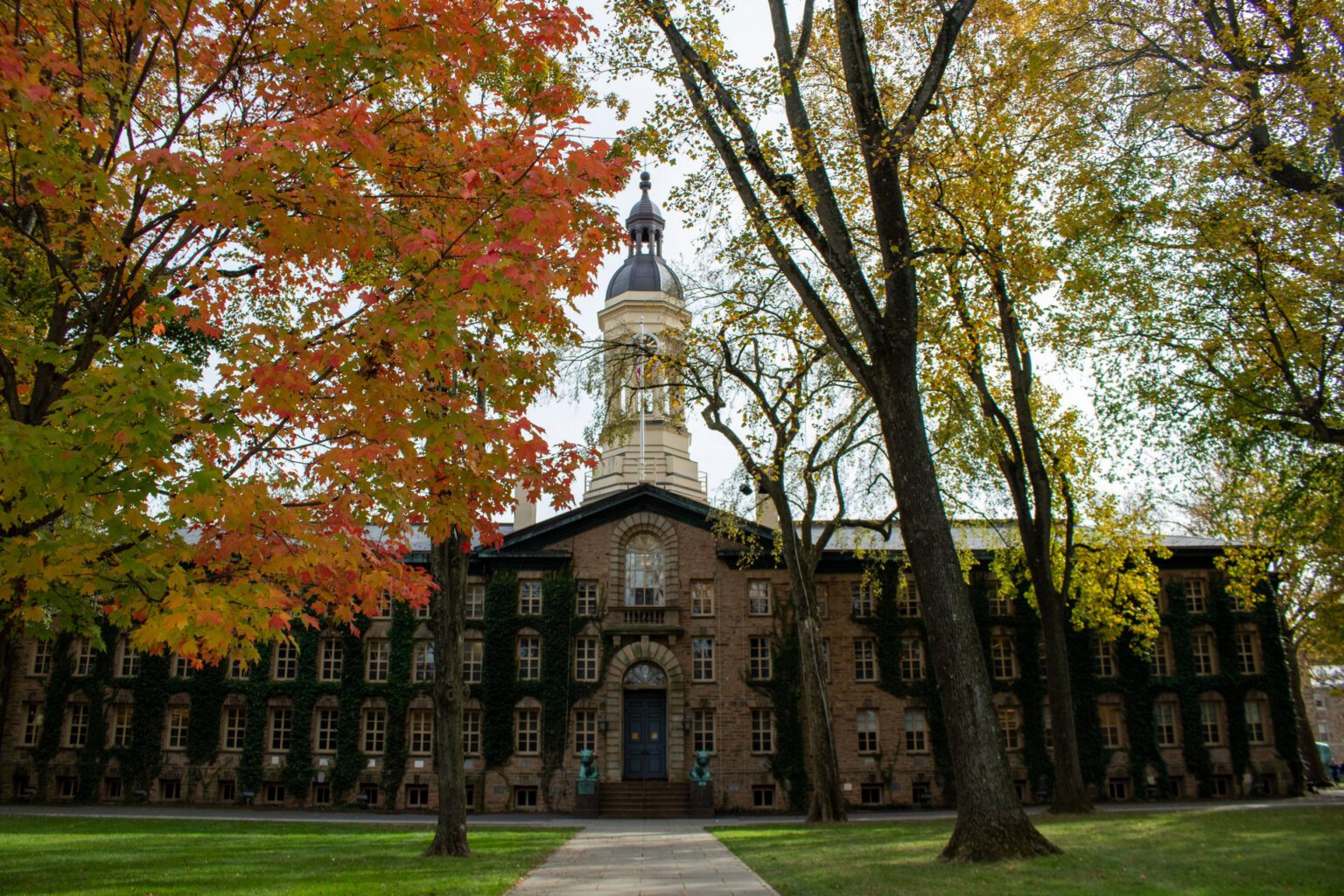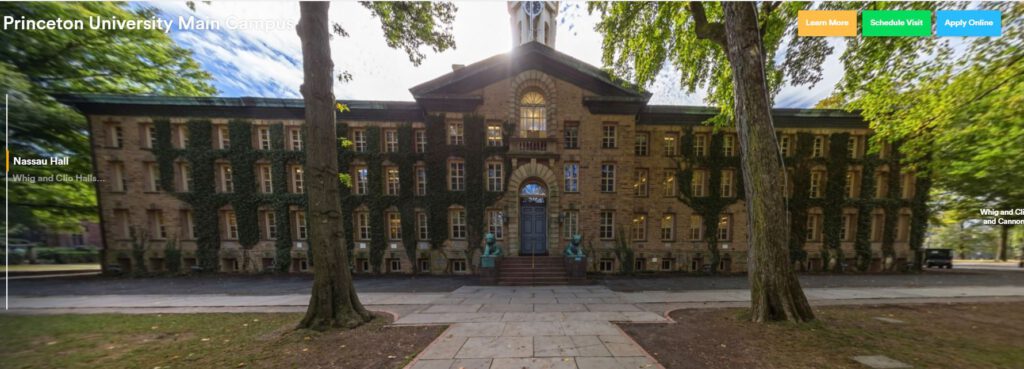Princeton University
Trips
12. Feb. 2021
Manfred Goschler

Princeton University is a private university and, with the universities of Yale and Harvard, is one of the most respected and richest universities in the world. This university can boast of many famous personalities, who either stood or stand as graduates (alumni) or in some other special relationship with the university.
When looking through the celebrities, I noticed some, whose work I wanted to see in more detail at later.
Now it was time to take a closer look around the university. Princeton University introduced itself with impressive words, I read it as an obligation to the nation and humanity.
In Service of Humanity
“Princeton University has a longstanding commitment to service, reflected in Princeton’s informal motto — Princeton in the nation’s service and the service of humanity — and exemplified by the extraordinary contributions that Princetonians make to society.”
Christopher L. Eisgruber
President of Princeton University, Class of 1983
We are now taking a virtual 360 degree tour of the campus by clicking on the following picture:
This campus, many buildings in the neo-Gotic style and over 200 years old, make a difference. I looked for a department, that deals with modern machines, like computers. I came across the computer science department with a topic that I am particularly interested in. It’s about people and modern machines like computers. The research area is entitled “Fairness and ethics”.
Numerous publications by Arvind Narayanan, the professor in this department, can be found there along with extensive sources. Although there were still some linguistic and technical hurdles, I looked at a few articles. I also took part in a (Youtube) lecture that was recommended by the author as an introduction to “Fairness and machine learning” and came back with a few questions from this (virtual) lecture.
First of all, as a layperson, I asked myself why these terms were chosen in the title.
“Machine learning” instead of “Artificial intelligence”?
Perhaps because machine learning is a little more tangible, more neutral and less biased than the term “artificial intelligence”, which is still looking for a more binding definition? Or simply because machine learning is seen as a branch of artificial intelligence? I thought this question should be easy to answer and so I put it on hold. But not the aforementioned concept of fairness. This is probably about a connection between ethical questions and software technology, as I would like to call this “machine learning”. First I asked myself about the background for this, the why, and I found answers relatively quickly in the following article “Why Software Engineering Courses Should Include Ethics Coverage” by Arvind Narayanan and Shannon Vallor. Now I could actually have continued to see the status of this project and delve deeper into this topic. I would have been interested in how the author links this ethical aspect of fairness with machine learning. Is it possibly “only” parameters of a learning program or part of data sets with which the learning program is fed, or is there more to it than what I could well imagine? Interest was piqued, but more clarity about the term is also needed.
Fairness expresses an idea of justice and I can imagine that it is one of the most important values in a community. I suspect, that the development of modern calculating machines will grow even faster compared to the past, as will the awareness of people, since they will have more and more contact with modern calculating machines in everyday life. Each individual, as well as society, will have to ask how we want to deal with it. Perhaps it is easier to make this clear to oneself if one negates the concept of fairness and imagines appropriate scenarios.
Note: the meaning of fairness may not be the same in every country, that’s why I will have to assess this in more detail later.
Conclusion: This topic is very important and the title is well chosen
Even if you only travel virtually in Princeton and its university, it is noticeable that former graduates or scientists who are close to the university and have achieved something special are particularly valued. This also applies to the computer science department, which highlights some pioneers of this science on its website.
„Welcome to the Department of Computer Science at Princeton University. Princeton has been at the forefront of computing since Alan Turing, Alonzo Church and John von Neumann were among its residents.”
In computer science, of course, the computer plays a central role and since the core of a computer is still about converting numbers or binary characters and processing them, I still allow myself to call it a modern calculating machine, although it is of course much more than performs arithmetic operations only.
So who invented this technological marvel? This question was discussed earlier in the early 1980s, perhaps because different names appeared in the computer science textbooks of the time, such as Charles Babbage, Konrad Zuse, Alan Turing or John von Neumann. Since the concept of the computer goes back to the 17th century and has continued to develop to this day, there is no clear definition either, so this question cannot of course be answered in this form. But there were some people involved in developing it.
Two special people among them, who taught at Princeton were John Von Neumann, who defined a reference model for architecture for computers and published it in 1945, and Alan Touring, who used the Turing machine in 1936/1937 to design a computer model to depict the functioning of a computer and to formalize terms such as predictability and algorithms and thus make them accessible to mathematical methods. These people were representatives of modern computers 40 years ago and still are today, so I would like to emphasize them in order to be able to later make a more precise distinction to the current state of the art. The John Von Neumann architecture is still particularly evident to me, and I still fondly remember building my own computer in the mid-eighties, when I had enough opportunity to get to know the interaction of the components up to the development of the basic software.
In addition to many excellent scientists, one of the most famous who emigrated to the USA in 1933, should not be missing, did research at the Institute for Advanced Study and also taught at Princeton University. He worked at a time when there were no modern computers. I wonder if Albert Einstein would have liked today’s computers and made use of it. His research, which shaped a new worldview and his unconventional way inside and outside of science, as can be seen from some of his quotes, have made him something special.
The Einstein Papers Project, which was launched in 1977 in order to gain a complete picture of Einstein’s extensive legacy, deals with an extensive scientific analysis of Einstein’s extensive legacy. The publications can be found under The Collect Papers of Albert Einstein. Princeton University Press is the publisher of this project, the Albert Einstein Archives of the Hebrew University in Jerusalem are involved and are supported by other partners.
I myself keep catching myself getting some idea of his research on the theory of relativity when it comes to the relationships between physical quantities such as space and time, matter and energy. Although I try to develop a better understanding of it, whether this succeeds remains rather questionable, but remains a great amazement :).




